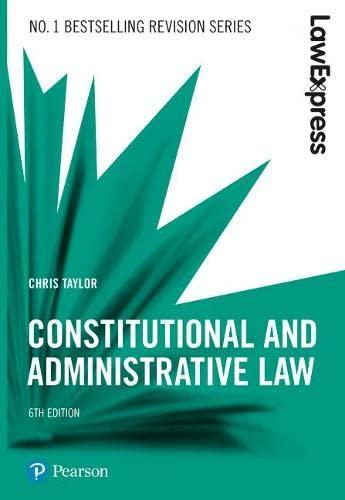Question
In Plessy v. Ferguson the Supreme Court held that the state of Louisiana did not violate the Fourteenth Amendment by establishing and enforcing a policy
"In Plessy v. Ferguson the Supreme Court held that the state of Louisiana did not violate
the Fourteenth Amendment by establishing and enforcing a policy of racial segregation in
its railway system. Justice John Marshall Harlan wrote a memorable dissent to that
decision."
Source: McKenna, George, ed. A Guide to the Constitution That Delicate Balance (New
York, 1984), pp. 384-386. ~ chnm.gmu.edu
Judge Harlan's dissent
...It was said in argument that the statute of Louisiana does not discriminate against
either race but prescribes a rule applicable alike to white and colored citizens. But this
argument does not meet the difficulty. Everyone knows that the statues in question had its
origin in the purpose, not so much to exclude white persons from railroad cars occupied by
blacks, as to exclude colored people from coaches occupied by or assigned to white persons.
Railroad corporations of Louisiana did not make discrimination among whites in the
matter of accommodation for travellers. The thing to accomplish was, under the guise of
giving equal accommodations for whites and blacks, to compel the latter to keep to
themselves while travelling in railroad passenger coaches. No one would be so wanting in
candor as to assert the contrary. The fundamental objection, therefore, to the statues is
that it interferes with the personal freedom of citizens....If a white man and a black man
choose to occupy the same public conveyance on a public highway, it is their right to do so,
and no government, proceeding alone on grounds of race, can prevent it without infringing
the personal liberty of each....
The white race deems itself to be the dominant race in this country. And so it is, in
prestige, in achievements, in education, in wealth, and in power. So, I doubt not, it will
continue to be for all time, if it remains true to its great heritage and holds fast to the
principles of constitutional liberty. But in the view of the Constitution, in the eye of the
law, there is in this country no superior, dominant, ruling class of citizens. There is no
caste here. Our Constitution in color-blind and neither knows nor tolerates classes among
citizens. In respect of civil rights, all citizens are equal before the law. The humblest is the
peer of the most powerful. The law regards man as man and takes no account of his
surroundings or of his color when his civil rights as guaranteed by the supreme law of the
land are involved...
The arbitrary separation of citizens, on the basis of race, while they are on a public
highway, is a badge of servitude wholly inconsistent with the civil freedom and the equality
before the law established by the Constitution. It cannot be justified upon any legal
grounds."
Questions:
1- What does Judge Harlan believe is the basis for Louisiana's segregation?
___________________________________________________________________________
_____________________________________________________________________
2- What is the fundamental objection to the Louisiana statue?
___________________________________________________________________________
_____________________________________________________________________
3- What does Judge Harlan mean when he writes that the Constitution is color-blind?
___________________________________________________________________________
_____________________________________________________________________
4- What is Judge Harlan's conclusion about "the arbitrary separation of citizens"?
___________________________________________________________________________
_____________________________________________________________________
5- Explain your position on this issue.
___________________________________________________________________________
________________________________________________________________________
________________________________________________________________________
________________________________________________________________________
A Professor's Perspective on Teaching about Jim Crow Segregation:
"Displaying photos of segregated water fountains utterly fails to convey how Jim Crow's
long reign shaped life for generations of African American and white Southerners.
Whether in neighborhood stores or on public sidewalks, segregation established an
intricate set of rules to govern every kind of interracial contact that were reinforced by its
repeated daily humiliations. Laws and practices that assigned African American laborers
the most menial and lowest-paying jobs and kept them out of labor unions ensured their
economic subordination.
White newspapers stirred fears of black criminality and white police often arrested black
people for the most minor infractions. As the primary source from the Cleveland Advocate
in 1918 suggests, all-white juries and white judges punished African Americans more
severely than whites, even when whites had committed the greater crime...More broadly,
Southern courts sentenced a disproportionate number of African Americans to chain gangs
and prison.
Segregation literally rendered African American life less valuable than white life. Black
Southerners had higher mortality rates, for example, because they lived in areas where
white officials did not invest in improving sanitation and because the lack of public
spending on health services for black people typically meant fewer hospitals and treatment
options. An untold number of black adults and black children died as a result."
~ Katherine Mellen Charron [Associate Professor of History at North Carolina State
University]; teachinghistory.org
Questions:
1- Why does Professor Charron believe that "displaying photographs of segregated
water fountains utterly fail to convey how Jim Crow's long reign shaped life for
generations of African Americans"?
________________________________________________________________________
________________________________________________________________________
2- What examples does Professor Charron provide that demonstrate the oppression of
African Americans under Jim Crow segregation?
________________________________________________________________________
________________________________________________________________________
________________________________________________________________________
________________________________________________________________________
3- How does this reading passage increase your understanding of Jim Crow
segregation?
________________________________________________________________________
________________________________________________________________________
________________________________________________________________________
________________________________________________________________________
4- What then might be a more effective way to teach the effects of Jim Crow
segregation on African Americans? Explain your answer.
________________________________________________________________________
________________________________________________________________________
Step by Step Solution
There are 3 Steps involved in it
Step: 1

Get Instant Access to Expert-Tailored Solutions
See step-by-step solutions with expert insights and AI powered tools for academic success
Step: 2

Step: 3

Ace Your Homework with AI
Get the answers you need in no time with our AI-driven, step-by-step assistance
Get Started


